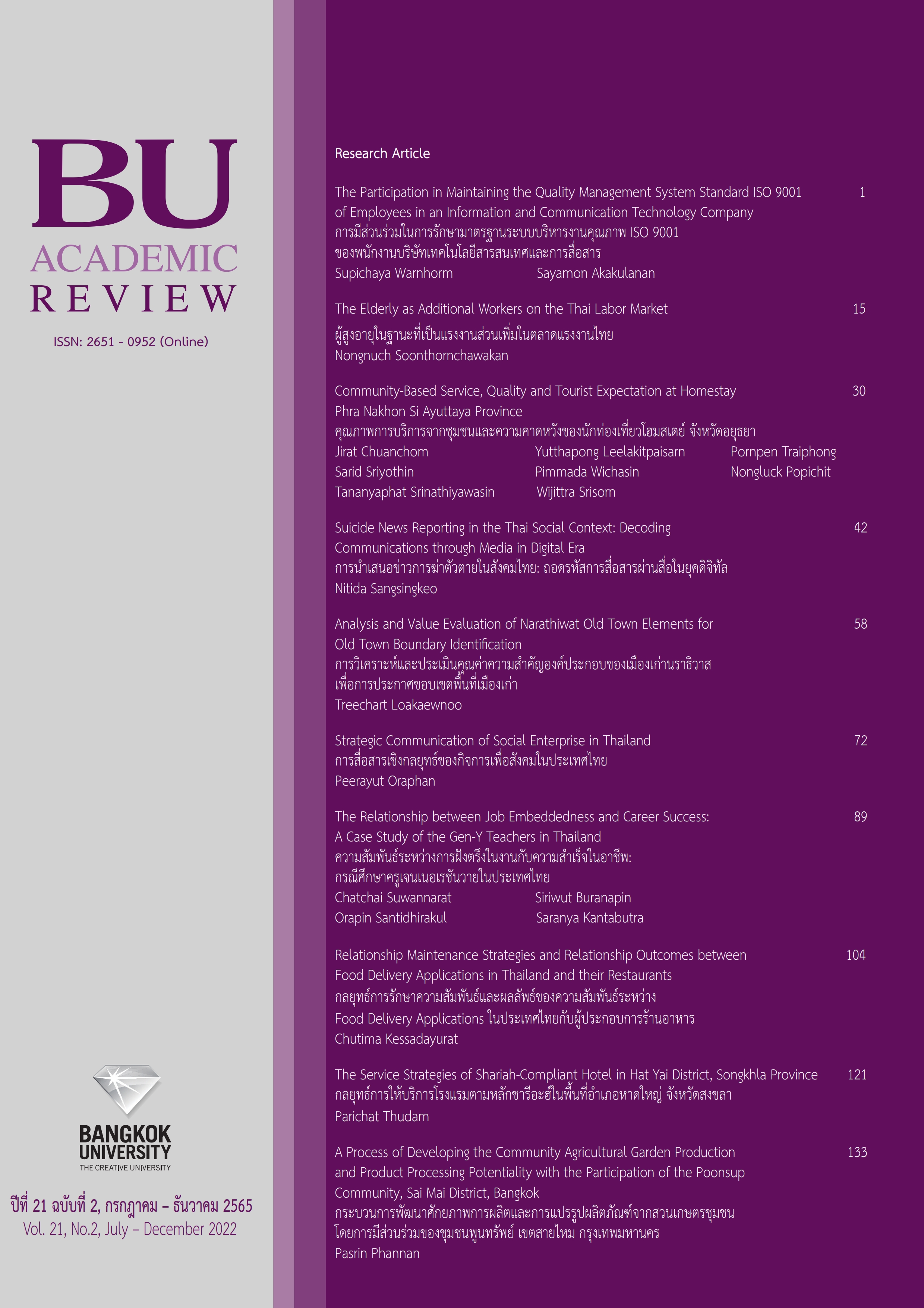The Service Strategies of Shariah-Compliant Hotel in Hat Yai District, Songkhla Province
Main Article Content
Abstract
The purpose of this study was to study the characteristics of shariah-compliant hotel and the service strategies of shariah-compliant hotel in Hat Yai District, Songkhla Province. The study was conducted using qualitative research. Data was collected by interviewing hotel business entrepreneurs and Islamic leaders. The results of the study revealed that hotel services according to Shariah principles in Hat Yai District, Songkhla Province can be classified into 2 types, namely 1) partially shariah-compliant hotel and 2) fully shariah-compliant hotel. Entrepreneurs employ unique service differentiation strategies and create shariah hospitality awareness by naming hotels in muslim names and using halal kitchen certification standards to make their customers trust. In terms of public relations strategies, entrepreneurs use advertising channels through social media such as Facebook, Line and and word-of-mouth referrals of customers. The study of effect of shariah-based services on hotel business operations in Hat Yai District, Songkhla Province found that shariah-based services had a beneficial effect on the business, causing more muslim customers to use the service and have increased income, especially the revenue from the seminar. However, Shariah hotel services do not affect hotel room rates. Room rates are in accordance with 1-5 star hotel tourism accommodation standards. This is because hotels according to shariah principles are classified as alternative hotels which the customer will decide to choose to stay for the comfort of the service received that is in accordance with the religious principles. The problem that hotels encountered in providing shariah services was some customers did not understand that some services are not available in Shariah-compliant hotels.
Article Details

This work is licensed under a Creative Commons Attribution-NonCommercial-NoDerivatives 4.0 International License.
The manuscript submitted for publication must be the original version, submitted only to this particular journal with no prior acceptance for publication elsewhere in other academic journals. The manuscript must also not violate the copyright issue by means of plagiarism.
References
Benrit, P., & Saiyasopon, S. (2018). Kānbō̜rihān čhatkān rōngrǣm hālān Thai kō̜ranī sưksā rōngrǣm nai
čhangwat Pattānī [The management of Thai halal hotels: A case study of hotels in Pattani]. Journal of Thai Hospitality & Tourism, 13(2), 66-77.
Chupchuwong, M. (2020). Kāntalāt rōngrǣm [Hotel marketing]. Bangkok: Chulalongkorn University
Press.
Doi, A. R. I. (1984). Shari'ah: The islamic law. London: Ta-Ha Publishers Ltd.
Gubrium, J. F., & Holstein, J. A. (1997). The new language of qualitative method. Oxford: Oxford
University Press.
Hayeemad, M., Hasama, A., Noipom, T., & BostanAli, W. (2020). Rōngrǣm thī mī khrūa hā lā
lakap ʻōkāt thāngkān talāt samrap nakthō̜ngthīeo Mutsalim [Halal kitchen hotel and its
opportunities in the Muslim tourist market], Business Review, 12(1), 104-118.
Jafari, J., & Scott, N. (2014). Muslim world and its tourisms. Annals of Tourism Research, 44, 1-19.
Mastercard-Crescentrating. (2017). Global Muslim Travel Index 2017 (GMTI 2017). Retrieved January, 4,
, from https://newsroom.mastercard.com/asia-pacific/files/2017/05/Report-Mastercard- CrescentRating-GMTI-2017-20mb.pdf
Office Provincial Commercial Affairs Songkhla. (2018). Khō̜mūn kāntalāt čhangwat Songkhlā
pračham pī sō̜ngphanhārō̜ihoksip [Songkhla province market data 2017]. Retrieved January, 4,
, fromwww.aecthaibiz.com › wapppcoc › upload › File_IPD.
Omar, C. M. C., & Adaha, N. M. A. (2019). An operational shariah compliant hotel requirements:
Malaysia experience. Journal of Hospitality and Networks, 1, 23-33.
Omar, C. M. C., Islam, M. S. & Adaha, N. M. (2013). Perspectives on Islamic tourism and shariah
compliance in the hotel management in Malaysia. Islamic Economics and Business, 1(1), 1-8.
Rosenberg, P., & Choufany, H. M. (2009). Spiritual lodging the shariah-compliant hotel concept. Dubai:
HVS Global Hospitality Services-Dubai.
Saad, H. E., Ali, B. N. & Abdel-Ati, A. M. (2014). Sharia-Compliant hotels in Egypt: Concept and
challenges. Advances in Hospitality and Tourism Research, 2(1), 1-15.
Sahida, W., Rahman, S. A., Awang, K., & Man, Y. C. (2011). The implementation of shariah compliance
concept hotel: De Palma hotel Ampang, Malaysia. Humanities, Historical and Social Sciences (IPEDR), 17, 138-142.
Sukhom, A., Kraiwat, K., & Thawarom, U. (2020). Sakkayaphāp læ khwām phrō̜m phư̄a rō̜ng rap
kānthō̜ngthīeo withīhālān khō̜ng čhangwat thō̜ngthīeo lak nai prathēt Thai [Potential and readiness to support the halal tourism of main travel province in Thailand]. NRRU Community Research Journal, 14(2), 233-244.
Tantasuntisakul, W., & Wongkit, M. (2019). Konlayut kānphatthanā rōngrǣm hālān kō̜ranī sưksā čhangwat Krabī [The strategic development for halal hotel: A case study of Krabi province], Ratchaphruek Journal, 17(3), 122-128.
Tongsamsi, K., Jiaramat, A., Tongsamsi, I., Luxchaigul, N., Thongthæ, P., & Bunnak, S. (2018).
Khwāmtō̜ngkān rap bō̜rikān dān thī phak khō̜ng nakthō̜ngthīeo Mutsalim [Demands of Muslim touristsfor halal-friendly accommodations], Silpakorn University Journal, 38(3), 127-147.
Thudam, P., Amage, N., & Bunmak, S. (2017). Sathānakān læ kān prap tūa khō̜ng phūprakō̜pkān
thurakit thī phak nai phư̄nthī sām čhangwat chāidǣn phāk tai [Situation and adjustment of
accommodation business in 3 southern border provinces]. Bangkok: The Thailand Research
Fund.
Yoddamnoen-Attig, B., & Tangchonlathip, K. (2009). Kān wikhro̜ khō̜mūn chœ̄ng khunnaphāp:
Kānčhatkān khō̜mūn kān tīkhwām læ kān hākhwām māi [Qualitative data analysis: Data management, interpretation and semantics]. Nakhonpathom: Institute for Population and Social Research, Mahidol University.


